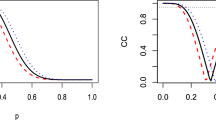Abstract
In hypotheses testing, such as other statistical problems, we may confront imprecise concepts. One case is a situation in which the hypotheses of interest are imprecise. In this paper, we recall and redefine some concepts about testing fuzzy hypotheses and then we provide a minimax approach to the problem of testing fuzzy hypotheses by using crisp (non-fuzzy) data. We give some illustrative/numerical examples, by which we study the effect of fuzziness by using the power functions of minimax tests.








Similar content being viewed by others
References
Arnold BF (1996) An approach to fuzzy hypothesis testing. Metrika 44:119–126
Arnold BF (1998) Testing fuzzy hypothesis with crisp data. Fuzzy Sets Syst 94:323–333
Blanco-Fernández A, Casals MR, Colubi A, Corral N, García-Bárzana M, Gil MA, González-Rodríguez G, López MT, Lubiano MA, Montenegro M, Ramos-Guajardo AB, de la Rosa de Sáa S, Sinova B (2013) Random fuzzy sets: a mathematical tool to develop statistical fuzzy data analysis. Iranian J Fuzzy Syst 10:1–28
Casals MR, Gil MA, Gil P (1986a) On the use of Zadeh’s probabilistic definition for testing statistical hypotheses from fuzzy information. Fuzzy Sets Syst 20:175–190
Casals MR, Gil MA, Gil P (1986b) The fuzzy decision problem: an approach to the problem of testing statistical hypotheses with fuzzy information. Eur J Oper Res 27:371–382
Casella G, Berger RL (1990) Statistical inference. Brooks/Cole Publishing, Belmont
Chachi J, Taheri SM, Viertl R (2012) Testing statistical hypotheses based on fuzzy confidence intervals. Austrian J Stat 41(4):267–286
Filzmoser P, Viertl R (2004) Testing hypotheses with fuzzy data: the fuzzy \(p\)-value. Metrika 59:21–29
Grzegorzewski P, Szymanowski H (2014) Goodness-of-fit tests for fuzzy data. Inf Sci 288:374–386
Lubiano, MA, Salas, A, Gil, MA (2016) A hypothesis testing-based discussion on the sensitivity of means of fuzzy data with respect to data shape. Fuzzy Sets Syst. DOI:10.1016/j.fss.2016.10.015
Nguyen HT, Walker EA (2000) A first course in fuzzy logic, 2nd edn. Chapman & Hall/CRC, London
Parchami A, Taheri SM, Mashinchi M (2010) Fuzzy \(p\)-value in testing fuzzy hypotheses with crisp data. Stat Pap 51(1):209–226
Parchami A, Ivani R, Mashinchi M (2011) An application of testing fuzzy hypotheses: a soil study on bioavailability of Cadmiuma. Sci Iranica 18(3):470–478
Parchami A, Taheri SM, Mashinchi M (2012) Testing fuzzy hypotheses based on vague observations: a \(p\)-value approach. Stat Pap 53(2):469–484
Parchami A, Taheri SM, Sadeghpour B, Mashinchi M (2016) Testing fuzzy hypotheses: a new \(p\)-value-based approach. In: Kahraman C, Kabak Ö (eds) Fuzzy statistical decision-making. Studies in Fuzziness and Soft Computing, vol 343. Springer, Berlin, pp 155–173
Rohatgi VK, Ehsanes Saleh AK (2001) An introduction to probability and statistics, 2nd edn. Wiley, New York
Taheri SM (2003) Trends in fuzzy statistics. Austrian Journal of Statistics 32(3):239–257
Taheri SM, Behboodian J (1999) Neyman–Pearson Lemma for fuzzy hypotheses testing. Metrika 49:3–17
Taheri SM, Behboodian J (2001) A Bayesian approach to fuzzy hypotheses testing. Fuzzy Sets Syst 123:39–48
Taheri SM, Hesamian G (2013) A generalization of the Wilcoxon signed-rank test and its applications. Stat Pap 54:457–470
Tanaka H, Okuda T, Asai K (1979) Fuzzy information and decision in a statistical model. In: Gupta MM et al (eds) Advances in fuzzy set theory and applications. North-Holland, Amsterdam, pp 303–320
Torabi H, Behboodian J (2005) Sequential probability ratio test for fuzzy hypotheses testing with vague data. Austrian J Stat 34(1):25–38
Torabi H, Behboodian J (2007) Likelihood ratio tests for fuzzy hypotheses testing. Stat Pap 48:509–522
Viertl R (2011) Statistical methods for fuzzy data. Wiley, Chichester
Viertl R, Mirzaei Yeganeh S (2016) Fuzzy confidence regions. In: Kahraman C, Kabak Ö (eds) Studies in fuzziness and soft computing, vol 343. Springer, Berlin, pp 119–127
Zadeh LA (1965) Fuzzy sets. Inf Control 8:338–359
Zadeh LA (1968) Probability measures of fuzzy events. J Math Anal Appl 23:421–427
Acknowledgements
The authors would like to thank the respected anonymous referees and Editor-in-Chief whose comments improved the paper.
Author information
Authors and Affiliations
Corresponding author
Rights and permissions
About this article
Cite this article
Parchami, A., Taheri, S.M., Viertl, R. et al. Minimax test for fuzzy hypotheses. Stat Papers 59, 1623–1648 (2018). https://doi.org/10.1007/s00362-017-0926-4
Received:
Revised:
Published:
Issue Date:
DOI: https://doi.org/10.1007/s00362-017-0926-4




